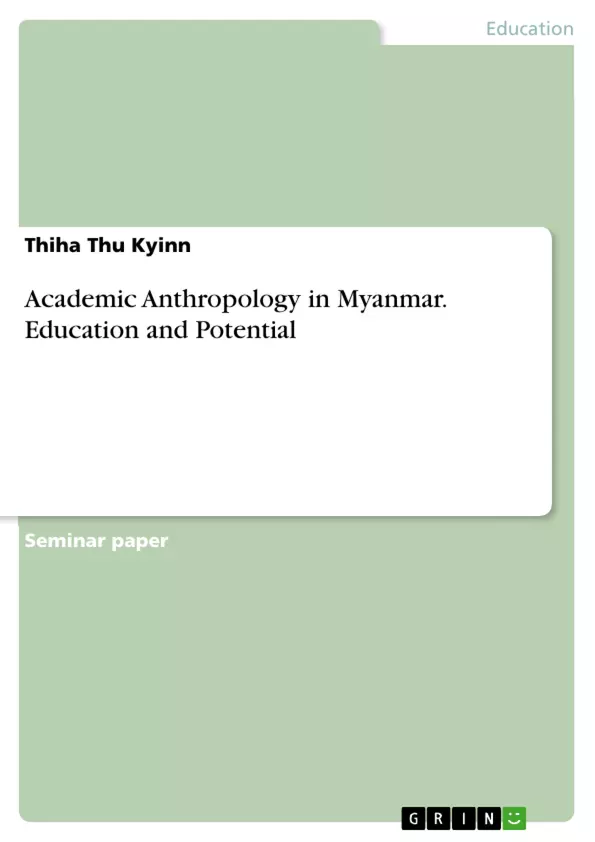This paper is an ethnography about how anthropology is taught as a major in universities in my home country, Myanmar. The aims of this ethnography is to explore the teaching methods, how it is different from my experience in University of Roehampton, why it is very underestimated by majority of people in the country and the potential of the subject. Initially, I come up with a hypothesis of possible variations in teaching methods, student ambition, case studies and potential career options as a UK student and compare my results to what I initially thought of.
Myanmar is a developing country of Southeast Asia with many historical turning points which makes the country's unique cultural melting pot. The country goes from monarchy to English colonization to being occupied by fascist Japanese and again taken over by English government during the second world war. After gaining independence in 4 January 1948, it was led by a socialist government with a military general and a president at its duel leaders. In 1962, the military launched a coup de tat and took over the country, putting the country under it's oppressive rule until 2011. These conditions greatly effects people's social lives and prevents a stable education system since the education of a country reflects the ideals of the government. With the ever-changing political power, each one influencing the students to a degree, the people of Myanmar lack a clear path to their goals. By conducting interviews with the teachers, students and faculty members of a university in Yangon, a former capital, I plan to find out why anthropology major is very rarely taken, discouraged by parents and looked down as a subject with no career option. My ultimate goal would be to unravel the questions of negativity and resurrect the dying subject.
Inhaltsverzeichnis (Table of Contents)
- Introduction
- Methods
- Background Information of Myanmar
- Education in Myanmar
- Anthropology in Myanmar
- Two Sides of a Coin (Teachers vs Students)
- Potential of Anthropology in Myanmar
- Conclusion
Zielsetzung und Themenschwerpunkte (Objectives and Key Themes)
This dissertation explores the teaching of anthropology as a major in Myanmar, comparing the methods and student experience with those of the University of Roehampton in the UK. The goal is to uncover why anthropology is undervalued in Myanmar and to examine its potential for shaping the country's development.
- The impact of unstable political situations on the education system in Myanmar
- The role of government in shaping education and its influence on subject choice
- The historical context of education in Myanmar, from pre-colonial times to the present
- The perception of anthropology as a discipline in Myanmar and its potential career options
- The influence of the government on students' goals and career paths
Zusammenfassung der Kapitel (Chapter Summaries)
- Introduction: This chapter examines the significance of education in shaping culture, knowledge, and innovation. It explores the role of education in fostering cultural identities and the potential for undermining minority cultures. It also introduces the context of this ethnographic study, focusing on the impact of unstable political situations on the education system in Myanmar.
- Methods: This chapter outlines the methodology of the dissertation, explaining the initial plan to conduct research at Yangon University and the challenges encountered during fieldwork. It also mentions the specific universities and departments involved in the study.
- Background Information of Myanmar: This chapter provides a historical overview of Myanmar, exploring its transition from a monarchy to British colonization, Japanese occupation, and eventual independence. It examines the country's unique cultural melting pot and the influence of changing political power on its social life and education system.
- Education in Myanmar: This chapter analyzes the evolution of education in Myanmar, examining systems before British colonization and how they transformed under different governments. It focuses on the current system and its impact on the education landscape.
- Anthropology in Myanmar: This chapter explores the teaching of anthropology in Myanmar, examining historical perspectives and its current state. It investigates why anthropology is often disregarded and its potential relevance to the country's development.
Schlüsselwörter (Keywords)
This dissertation focuses on the teaching of anthropology in Myanmar, exploring its history, current challenges, and potential. Key terms include education, ethnography, political instability, cultural identity, government influence, anthropology, career paths, and Myanmar's unique cultural context.
- Arbeit zitieren
- Thiha Thu Kyinn (Autor:in), 2019, Academic Anthropology in Myanmar. Education and Potential, München, GRIN Verlag, https://www.grin.com/document/1352242



